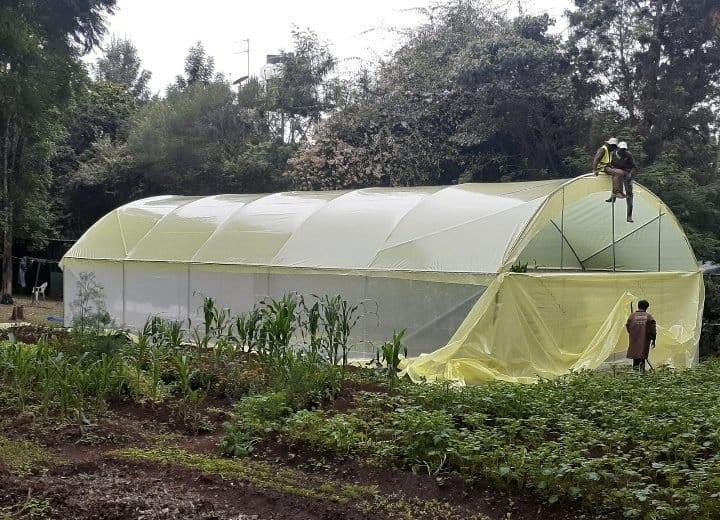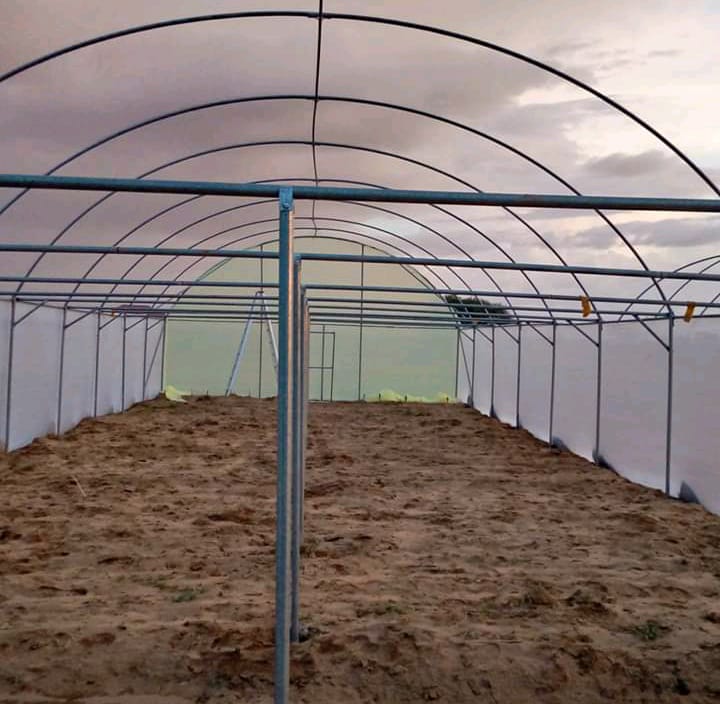Agriculture remains the backbone of Kenya’s economy, employing a large percentage of the population and contributing significantly to food security. However, farmers across the country continue to grapple with harsh climatic conditions, unpredictable rainfall, long dry spells, and increasing incidences of pests and diseases. For many, traditional open-field farming has become unreliable and financially risky.
This is where greenhouse farming comes in. At Symnet Agro Solutions Ltd, we are committed to empowering farmers in Kenya by providing affordable, modern greenhouse solutions that make farming possible all year round—regardless of weather conditions. Our goal is to ensure that farmers in arid and semi-arid areas, as well as those facing unpredictable rainfall patterns, can increase their yields, earn consistent income, and contribute to national food security.

In this blog, we will explore the key advantages of greenhouses in Kenya, and how Symnet Agro Solutions Ltd is making this technology accessible to every farmer.
1. Farming Throughout the Year
One of the biggest limitations of traditional farming in Kenya is its dependency on rainfall. With changing weather patterns and extended droughts, farmers often experience crop failures or are forced to abandon farming altogether.
A greenhouse creates a controlled microclimate, where temperature, humidity, and irrigation can be managed efficiently. This means that whether it’s the dry season in Turkana or heavy rains in Western Kenya, farmers can continue growing crops without interruption.
At Symnet Agro Solutions Ltd, we design and install greenhouses tailored to local conditions, enabling farmers to produce vegetables, fruits, and even flowers consistently throughout the year. This year-round production not only ensures food availability but also provides farmers with a steady income stream.
2. Higher Yields in Smaller Spaces
Greenhouses maximize land productivity. Compared to open-field farming, crops grown in a greenhouse typically yield two to three times more per unit area. This is because the enclosed environment minimizes crop losses caused by pests, diseases, and adverse weather.
For smallholder farmers in Kenya, who often have limited land, this is a game-changer. A greenhouse measuring just 8m by 15m can produce hundreds of kilograms of tomatoes, capsicum, or cucumbers every harvest—enough to feed a household and generate surplus for the market.
Symnet Agro Solutions Ltd provides both wooden and metallic greenhouses in different sizes, ensuring that farmers with varying budgets and land sizes can benefit.
3. Efficient Water Use
Water scarcity is one of the biggest challenges facing Kenyan farmers today. Open-field farming wastes large amounts of water through evaporation and runoff. In contrast, greenhouses are highly water-efficient, especially when combined with drip irrigation systems.
Drip irrigation delivers water directly to the roots of the plants, ensuring minimal wastage. Farmers in arid and semi-arid regions of Kenya—such as Kitui, Makueni, or Kajiado—can still produce healthy crops with limited water resources.
At Symnet Agro Solutions Ltd, we integrate modern drip irrigation into all our greenhouse installations, helping farmers save up to 60% of the water they would otherwise use in open farming.
4. Reduced Pest and Disease Pressure
Pests such as aphids, whiteflies, and caterpillars, as well as diseases like blight, are major threats to Kenyan farmers. They destroy crops and force farmers to spend heavily on pesticides.
Greenhouses act as a protective barrier, significantly reducing pest invasion. With the right insect nets and controlled spraying, farmers can manage pests effectively and reduce chemical use. This results in healthier crops and safer produce for consumers.
Symnet Agro Solutions Ltd also offers insect nets and shade nets as part of our greenhouse packages, ensuring maximum protection for crops.
5. Better Quality Produce
Kenya’s urban consumers and export markets demand high-quality produce that is uniform in size, color, and taste. Meeting this standard is difficult with open-field farming, where crops are exposed to inconsistent sunlight, pests, and fluctuating temperatures.
Greenhouse farming produces uniform and high-quality crops. Tomatoes grown in a greenhouse, for example, are usually larger, redder, and juicier than those grown in open fields. Such produce fetches higher prices in local markets and supermarkets, giving farmers better returns.
By working with Symnet Agro Solutions Ltd, farmers can meet these market standards consistently, opening up opportunities for both local and international markets.
6. Shorter Maturity Periods
Crops in greenhouses generally mature faster compared to those in open fields. The stable environment accelerates growth, meaning farmers can harvest earlier and sell their produce when market prices are still high.
For instance, tomatoes in a greenhouse can be ready for harvest within 8–10 weeks, compared to 12–14 weeks in open-field conditions. This faster turnaround allows for multiple growing cycles in a year, further boosting income.

7. Income Stability and Food Security
Kenya’s farmers often experience income instability because of seasonal farming. During the rainy season, everyone plants the same crops, leading to market oversupply and low prices. During the dry season, food scarcity drives prices up—but few farmers have crops to sell.
Greenhouses solve this problem by ensuring year-round production. Farmers can time their harvests to coincide with off-peak seasons when prices are highest. This gives them greater control over market timing and ensures better profitability.
Symnet Agro Solutions Ltd supports farmers by offering training on crop scheduling and market access, ensuring they get maximum value for their produce.
8. Employment Creation and Youth Involvement
Greenhouse farming is not only profitable but also attractive to the youth. Unlike traditional farming, which is labor-intensive and dependent on weather, greenhouses represent modern, innovative, and more manageable agriculture.
By adopting greenhouse farming, young people can venture into agribusiness, create employment opportunities, and reduce over-reliance on formal jobs. Symnet Agro Solutions Ltd is passionate about engaging Kenya’s youth in agriculture by offering affordable greenhouse packages and technical support.
9. Customizable and Affordable Solutions
Many farmers in Kenya fear that greenhouses are expensive and only for large-scale producers. At Symnet Agro Solutions Ltd, we have worked hard to dispel this myth. We design affordable greenhouse packages—from small-scale units for kitchen gardening to larger commercial setups.
We also provide flexible solutions, including both wooden and metallic greenhouses, depending on farmers’ budgets and preferences. Our goal is to make greenhouse technology accessible to every farmer, regardless of location or income level.
10. Contribution to Climate Change Adaptation
Climate change is no longer a distant threat—it is a daily reality for Kenyan farmers. Erratic rainfall, prolonged droughts, and rising temperatures are reducing agricultural productivity.
Greenhouses play a key role in helping farmers adapt. By creating a controlled growing environment, they reduce dependence on rainfall and protect crops from extreme weather events. This resilience is critical for ensuring long-term food security in Kenya.
At Symnet Agro Solutions Ltd, we view greenhouse farming as a sustainable solution that not only supports individual farmers but also strengthens Kenya’s agricultural sector against climate change.
Why Choose Symnet Agro Solutions Ltd?
At Symnet Agro Solutions Ltd, we don’t just sell greenhouses—we provide end-to-end farming solutions. Our services include:
-
Selling and installing both metallic and wooden greenhouses.
-
Integrating efficient drip irrigation systems.
-
Supplying agricultural nets for pest and climate protection.
-
Offering training and technical support to farmers.
-
Providing after-sales services to ensure successful farming.
Our mission is to ensure that farmers in Kenya, especially those in harsh climatic regions, can farm affordably, sustainably, and profitably.
Conclusion
The advantages of greenhouse farming in Kenya are undeniable: year-round production, higher yields, better quality produce, water efficiency, pest protection, and improved income stability. As climate change continues to affect traditional farming, greenhouses have emerged as a reliable solution for both smallholder and commercial farmers.
At Symnet Agro Solutions Ltd, we are proud to be part of this agricultural transformation. By making greenhouse technology affordable and accessible, we are helping farmers unlock their full potential, fight hunger, and secure sustainable livelihoods.
If you are a farmer looking to embrace modern farming and overcome the challenges of harsh climatic conditions, Symnet Agro Solutions Ltd is your trusted partner. Together, we can build a resilient and food-secure Kenya.
📞 Contact Symnet Agro Solutions Ltd today to learn more about our greenhouse packages and how we can support your farming journey.